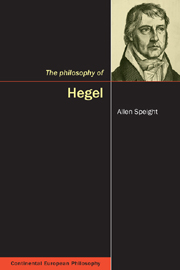Book contents
- Frontmatter
- Contents
- Acknowledgements
- Abbreviations
- Introduction
- 1 German Idealism and the young Hegel
- 2 The Phenomenology of Spirit
- 3 The Logic and Hegel's system
- 4 Ethics and politics
- 5 Hegel and the narrative task of history
- 6 Art, aesthetics and literary theory
- 7 Religion and philosophy
- Notes
- Guide to further reading
- Bibliography
- Index
4 - Ethics and politics
- Frontmatter
- Contents
- Acknowledgements
- Abbreviations
- Introduction
- 1 German Idealism and the young Hegel
- 2 The Phenomenology of Spirit
- 3 The Logic and Hegel's system
- 4 Ethics and politics
- 5 Hegel and the narrative task of history
- 6 Art, aesthetics and literary theory
- 7 Religion and philosophy
- Notes
- Guide to further reading
- Bibliography
- Index
Summary
Hegel's ethical and political philosophy has had more than its share of critics. Marx's early critique of Hegel's central political work, the Philosophy of Right, is perhaps the most famous point of attack in the German tradition, but others in that tradition, such as the scholar Rudolf Haym, have voiced unusually harsh criticisms of Hegel's supposed links to the most authoritarian currents within Prussian politics. In the Anglophone world, the high point of suspicion towards Hegel's ethics and politics can be found especially in the immediate aftermath of World War II, with Bertrand Russell's notorious claim that Hegel's concept of freedom amounted to no more than the “right to obey the police” and with the attack unleashed by Karl Popper in The Open Society and Its Enemies.
Much has changed since the heyday of this postwar “Hegel to Hitler” form of critique. The shift began to take place in the English-speaking world particularly with the publication of Herbert Marcuse's Reason and Revolution and the careful attempts of Shlomo Avineri and others to recover at least elements of Hegel's political doctrine for a more liberal tradition.
As for Hegel's ethics, a sustained complaint from a number of quarters in the present century, both analytic and continental, was about whether Hegel in fact had an ethics – the charge that morality and conscience, especially, simply disappeared into the larger dialectical machine. If not everyone held that view, many in the Anglophone tradition certainly thought that Hegel's ethics must rest on some musty Bradleyan account of “my ethical station” that was hardly worth consideration in the contemporary social world.
- Type
- Chapter
- Information
- The Philosophy of Hegel , pp. 67 - 86Publisher: Acumen PublishingPrint publication year: 2008

